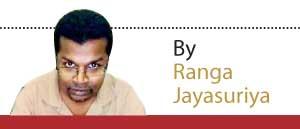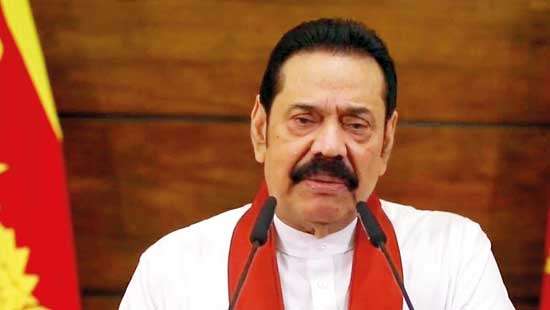Reply To:
Name - Reply Comment
Last Updated : 2024-05-16 00:00:00

Rarely any other time, save the campaign rallies, would the politicians speak so passionately about labour rights as they would today, the International Workers’ Day. But, in this quirky interest reeking of opportunism, there is a sense of irrelevance of what May Day was supposed to be.
interest reeking of opportunism, there is a sense of irrelevance of what May Day was supposed to be.
Consider today, Ranil Wickremesinghe, Sajith Premadasa and a horde of Ministers who would ride their Pajeros to the podium while the party members who are bused from four corners of the country march under the scorching sun to mark the historic gains of the labour movement born out of a campaign for eight- hour work day.
Political parties are spending an estimated Rs 1000 million for May Day rallies. Considering that most grassroots members are now living a hand-to-mouth existence, the sizable part of that expense would be borne out by the usual wheeler-dealer benefactors of political parties, who eye for the next big contract. Given that Sri Lanka does not have a law requiring the political parties to reveal private donations above a threshold, such contributions only foster a culture of high-level corruption.
Lost relevance
May Day has lost its original significance and even its contemporary relevance, more so in this part of the world, where it has been transformed into one of crass politicking, personal political aggrandizement and dynastic building.
The loss of original significance is universal, though. Trade union membership has dropped sharply over the decades, falling to less than 20 per cent of workers in 48 out of 92 countries, according to the International Labour Organization. According to a paper by Shyamali Ranaraja for the ILO, trade union membership in Sri Lanka has steadily declined, and it is estimated only 15 per cent of wage earners are members of trade unions, though the number of trade unions has increased, which may suggest a shift from large national unions to smaller sector-based unions.
The shift in economic significance in some of the union-heavy sectors, from coal, heavy manufacturing, and state-owned industries to the white-collar, high-tech-related industries, has also changed the demography of the workforce in most advanced nations. A new band of much younger, better educated, highly mobile workers are less interested in unionization. Some of these are true for the Sri Lankan context. It is also interesting that trade unions that could influence the state policy in this country- sometimes unduly- are the ones that are with skilled and professional workers, such as the Government Medical Officers Association (GMOA) University dons – and not the mass movements with a larger cadre base.
This dichotomy itself results from a long-standing manipulation of the supply and demand of labour through self-imposed supply caps on skilled professions. That has relegated a vast swathe of the labour force to a menial existence while building fortresses of privilege for a lucky few.
This dichotomy itself results from a long-standing manipulation of the supply and demand of labour through self-imposed supply caps on skilled professions
Dogmatism
The contemporary relevance of May Day is lost in the eye of trade union activism because, today, I can bet my two cents that they would be clamouring for the continuation of this very system. They would be decrying private universities, which is the only realistic way for most children in this country who could not get a place at a state university to have a higher education.
They would be opposing the private medical universities, which provide a cost-effective pathway for a medical degree for most deserving local students.
The speakers in those May Day rallies would be riling in anger at the restructuring of the loss-making State- Owned- Enterprises, though the stubborn truth is those SOEs have burnt more money than the public spending on education and health care. The loss of SOEs in 2022 alone is Rupees 743 billion, which accounts for 141,809 per household.
It is natural for trade union activists to want to hold on to their last bastions of influence, which happen to be public sector enterprises. However, the continuation of the status quo of the SOEs would come at a hefty cost to the average public, who increasingly favour the divesture of the SOEs.
This growing gulf between the aspirations of the average public and the manifestos of the trade unions makes the labour movement weaker. To make things worse, trade unions affiliated with main political parties often lack autonomy from the party’s political leadership. Their subordination to the wider political machination would be on display today, as the politicians take the front seats and trade unionists of the party are relegated to pet poodles. Membership of the political party-affiliated trade unions, be it Jathiya Sevaka Sangamaya, Nidahas Sevaka Sangamaya, or the JVP’s trade union, a vehicle for a high post in the same SOE when one’s own party comes to power. Such self-seeking calculations turn trade unions into servile accessories for the greater party’s political intrigue.
This stark reality would be on display today as the May Day rallies would become a show of political strength, much less a celebration of the labour movement.
The May Day would fire the first salvo of the presidential election campaign, with all the pole vaulting and horse-trading. Yet, the primary concerns of the Sri Lankan workers remain untouched by the political leaders and trade union leaders. Sri Lanka’s labour force participation rate is 47.1 in the fourth quarter of 2023. That number is well above 70 per cent in the developed world, OECD countries. Female labour force participation in Sri Lanka is an abysmal 32 per cent.
Interestingly, that is while the unemployment rate is 4.9 per cent, which suggests full employment. Meanwhile, the poverty rate is hovering over 24 per cent.
Sri Lanka should train the vast swath of its idle labour force and send them to work rather than relying on meagre state aid. Vocational training and university opportunities should be expanded to absorb new entrants and retrain the old, who toil in menial jobs.
Instead of these life-and-death priorities, the May Day rallies would be about political slander and self-promotion. They would be about Ranil, Sajith, and Anura Kumara and much less about the Sri Lankan working class.
Follow @Ranga Jayasuriya on X

15 May 2024
MoreGERIATRIC VICTIMISED RETIRED BANK EMPLOYEE WITHOUT PENSION. Monday, 06 May 2024 04:14 PM
TRADE UNIONISN IN SRI LANKA DIED IN 1972 AFTER THE 111 DAY STRIKE OF THE CEYLON BANK EMPLOYEES UNION - AUGUST 31 MIDNIGHT TO END DECEMBER!
FredSnR Monday, 06 May 2024 04:42 PM
Not an egalitarian society like Australia NZ where there is dignity of labour and Equal Opportunity, and people are paid for productivity not status, it is in their culture, it is how they work. SL hasn't changed for 75 tears where some have and some don't and its all about status not productivity, can't see it changing anytime soon, and the Corruption. SOES failed even though some had good intentions because of interference in two critical areas, Appointments and Tenders(award of contracts) If there is some way these two areas could be managed( given independence without interference) there could be some light at the end of the tunnel, just a point of view.
Add comment
Comments will be edited (grammar, spelling and slang) and authorized at the discretion of Daily Mirror online. The website also has the right not to publish selected comments.
Reply To:
Name - Reply Comment

15 May 2024 - 8 - 1621